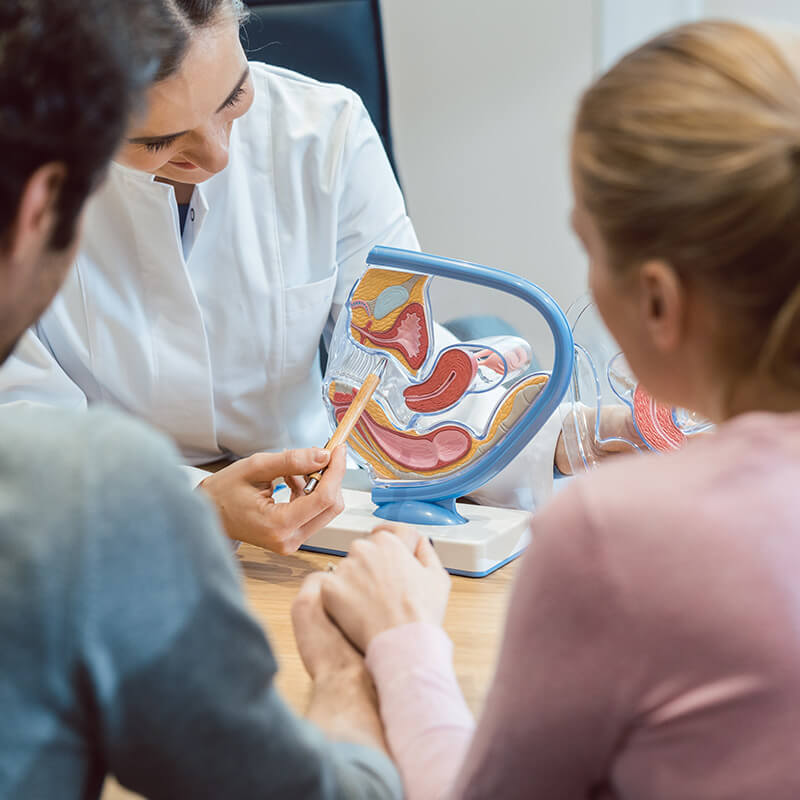
Gonadotropins are hormones naturally produced in your body and act to stimulate egg development and ovulation. There are two, one is known as the follicle-stimulating hormone (FSH) the other is luteinizing hormone (LH).
In both men and women, the brain’s pituitary gland releases gonadotropins, FSH and LH. Once these hormones are produced in women, they stimulate the ovaries to release an egg (oocyte).
When Do You Take Gonadotropin Hormone?
If your previous use of the fertility drugs Clomid or Letrozole did not result in pregnancy, your doctor may consider using gonadotropin hormone therapy to aid in ovarian stimulation.
With fertility treatments such as intrauterine insemination (IUI) or in vitro fertilization (IVF) you may be given an injection of FSH or a combination of FSH and LH that stimulate your ovaries to make multiple follicles. The follicles are small fluid-filled cysts in your ovaries where eggs develop and mature. Your doctor may elect to give these hormones in combination with other fertility medications such as clomiphene citrate (clomid).
Gonadotropins are typically given early in your menstrual cycle so that multiple eggs (oocytes) can develop and mature over the next 7-10 days. Once they have reached the point of maturity, you may be given an additional fertility medication called human chorionic gonadotropin (hCG) that aids to trigger the release of the egg into the fallopian tubes or prepares your eggs for retrieval if IVF is planned.
You may be prescribed Gonadotropin hormones if Clomid or Letrozole did not result in pregnancy. Often patients with PCOS are treated with this injectable fertility medication. Unlike Letrozole that stimulates your body to make and release follicle-stimulating hormone (FSH), gonadotropins actually contain FSH (e.g. Gonal F, Follistim) or a combination of FSH and LH (e.g. Menopur, Repronex).
These fertility medications classified as Gonadotropins, stimulate the gonads that are found in the reproductive sites of males and females. The male gonads are known as the testes and the female gonads are the ovaries.
What are the Side Effects of Gonadotropin Injections?
As always check, with your doctor if any side effects occur including ones not listed below. The following is a list of minor side effects that could occur
- Abdominal or stomach pain (severe)
- Bloating (moderate to severe)
- Decreased amount of urine.
- Feeling of indigestion.
- Nausea, vomiting, or diarrhea (continuing or severe)
- Pelvic pain (severe)
- Shortness of breath.
- Weight gain (rapid)

Other side effects that you need to be aware of could include but not limited to:

Ovarian Hyperstimulation Syndrome (OHSS)
When this occurs, patients may experience enlarged ovaries with some abdominal fluid accumulation following gonadotropin stimulation of the ovaries As reported by the American Society of Reproductive Medicine OHSS occurs in 10% of gonadotropin cycles and results in some discomfort but usually resolves quickly. Only in 1% of cases do women show signs of a more severe reaction (severe OHSS). This can occur more often with polycystic ovarian syndrome or patients with a previous history of OHSS.
Multiple Gestation
With the use of injectable gonadotropin fertility treatment, with or without IUI, you may experience multiple births, most frequently twins. As reported by ASRM, this can happen in up to 30% of women electing the use of these hormones and/or drug therapies. Multiple births results from multiple eggs that are stimulated during either an ovulation induction treatment or with the number of embryos that are transferred in an IVF cycle.
Ectopic Tubal Pregnancy
In gonadotropin hormone treatment, the incidence of ectopic tubal pregnancy only increases slightly over naturally occurring pregnancies as reported by Reproductivefacts.org. This condition is one where a fertilized egg does not attach to the to the inside of the uterus as in a normal pregnancy but implants itself typically in the fallopian tube which is not designed to mature a fetus to term. Ectopic pregnancies, which are pregnancies outside of the uterus, can also occur in other locations besides the tube.
Ovarian Torsion (Twisting)
Rarely a woman can experience ovarian torsion (twisting) immediately after gonadotropin treatment. It occurs in 2% or less of stimulation cycles. Because the increase in follicles adds more weight found in the ovary, it can rotate from this lopsided weight distribution causing it to twist and stay twisted. If this occurs, the blood supply to the ovary becomes strangulated and surgery must be performed to untwist the ovary.
